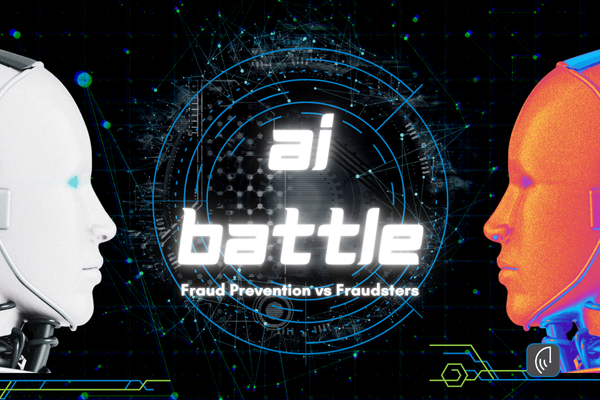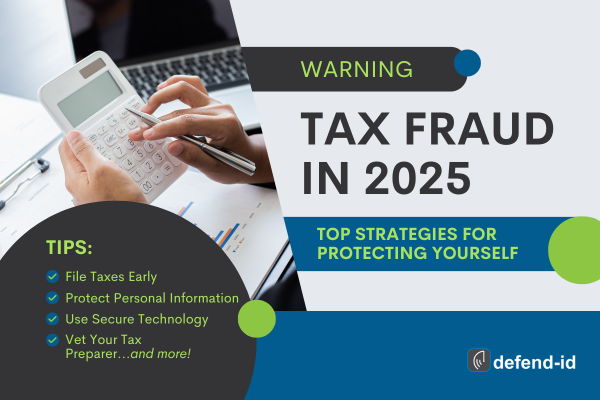
by Brian Thompson | Feb 5, 2025 | Breach, Identity Theft, Scams
Artificial intelligence (AI) is changing how companies and people protect themselves from fraud. AI helps find and stop fraud while also giving criminals new ways to trick people. This article explains both sides of AI in fraud prevention in clear, simple language.
How AI Helps Criminals Commit Fraud
Deepfakes and Fake Identities
AI can create deepfakes, which are very realistic videos, audio clips, and images that look real but are fake. Criminals use deepfakes to create fake identities.
Example: A fake video of a company leader might trick a business into sending money to a criminal.
Here is a fun example (note – this was done 3 years ago, consider how much better and accessible AI is today!): Tobey Maguire instead of Tom Holland in Spider-Man
AI-Driven Scams
Criminals use AI to create smart scams. They design phishing emails and phone calls that sound very real. These scams make it easier to steal money or personal information.
Important Numbers
- The FBI’s Internet Crime Complaint Center (IC3) said AI-assisted phishing scams increased by 35% in 2022. (Source: FBI IC3, 2022 – visit ic3.gov for more information.)
- Cybersecurity Ventures (2023) predicts that losses from AI-enhanced fraud could reach $20 billion by 2025.
How AI Helps Stop Fraud
Smart Computer Programs
Machine learning fraud detection systems use AI to study large amounts of data. They look for patterns that seem odd and can quickly spot fraud. This helps stop fraud before it causes big problems.
Watching for Strange Activity
AI tools can monitor transactions and user actions in real-time. They check every move and alert someone if something seems wrong. This fast response helps prevent more fraud.
Success Stories
- A 2021 report by IBM Security found that companies using AI fraud detection systems reduced fraud losses by 25% in one year. (Source: IBM Security, 2021 – visit ibm.com/security for details.)
- Some big banks have seen a 30% drop in fraud after using AI systems. (Source: McKinsey & Company, 2022 – learn more at mckinsey.com.)
Working With Other Technologies
Using AI with other tools like blockchain and behavior analysis makes fraud prevention even stronger. This mix helps companies protect customers and build trust.
The Ongoing Battle: Fraudsters vs. Fraud Detectors
Fighting Back with AI
As AI improves, criminals also get better at using it. They find new ways to beat security systems. This means the people who build AI tools must keep updating them to stop these tricks.
More Money for AI Research
Companies and governments are spending more money to improve AI for security. Working together, they hope to stay ahead of criminals who use AI for fraud.
Ethics, Laws, and Rules in AI Fraud Prevention
Balancing Safety and Privacy
While AI in fraud prevention has many benefits, it also raises questions about privacy. Companies must use AI carefully so that it does not invade people’s personal lives. Using AI safely and respectfully is very important.
Current Rules and Future Changes
Laws like the General Data Protection Regulation (GDPR) in Europe and the California Consumer Privacy Act (CCPA) in the United States help protect personal data. As AI changes, lawmakers need to update these rules to keep up with new challenges.
The Future of AI in Fraud Prevention
What to Expect Next
The future will bring even more advanced AI tools. Both criminals and defenders will continue to improve their techniques. New tools and better ways to watch for fraud will be needed.
Tips for Companies
- Invest in Advanced AI Tools: Use the latest AI systems to spot fraud quickly.
- Keep Watching All the Time: Real-time monitoring of transactions is very important.
- Train Employees: Teaching staff about new fraud scams can help protect the company.
Tips for Lawmakers
- Create Flexible Rules: Laws should be updated often to keep up with new technology.
- Support Cybersecurity Research: More funding is needed to develop new tools to fight AI-driven fraud.
Frequently Asked Questions (FAQ)
Q: What is AI in fraud prevention?
A: AI in fraud prevention uses artificial intelligence to detect and stop fraud. It can also be misused by criminals to create smarter scams.
Q: How does AI help stop fraud?
A: AI helps by monitoring transactions in real-time, spotting unusual patterns, and alerting companies when something seems wrong.
Q: Can criminals use AI to commit fraud?
A: Yes, criminals can use AI to create deepfakes, fake identities, and smart scams that make it harder to tell real messages from fake ones.
Conclusion
AI in fraud prevention shows both good and bad sides. On one side, AI gives companies strong tools to detect and stop fraud. On the other, criminals use AI to create smarter scams. To keep everyone safe, companies, tech experts, and lawmakers must work together. By using AI responsibly, we can build stronger defenses and a safer future.
References
- FBI Internet Crime Complaint Center (IC3), 2022 – ic3.gov
- Cybersecurity Ventures, 2023 – Annual Cybercrime Report, 2023
- IBM Security, 2021 – ibm.com/security
- McKinsey & Company, 2022 – mckinsey.com
Links to Related Topics:
Share this article on Twitter and Facebook to help others learn how AI in fraud prevention works.

by Brian Thompson | Jan 22, 2025 | Identity Theft, Scams
Tax fraud will be a growing threat in 2025. Check out these strategies for protecting yourself from tax fraud, including early filing, recognizing scams, and securing your data.
Tax fraud has become a sophisticated and costly issue affecting millions every year. In 2024 alone, the IRS identified and stopped $2.1 billion in fraudulent tax returns. Protecting yourself in 2025 requires an informed approach to protecting personal and financial data.
Below, we’ll look at the types of tax fraud, warning signs, and actionable steps you can take to mitigate risks.
Understanding Tax Fraud
What Is Tax Fraud?
Tax fraud occurs when an individual or organization intentionally falsifies information on tax returns to evade taxes or steal refunds. This can include inflating deductions, underreporting income, or filing false returns using stolen identities.
How Tax Identity Theft Works
Tax identity theft is a common subset of tax fraud where criminals use stolen personal information, like Social Security numbers (SSNs), to file fraudulent tax returns. Victims often discover the fraud only when their legitimate returns are rejected.
Who Is at Risk?
While everyone is vulnerable, these groups are particularly targeted:
- Seniors, due to phone scams and phishing emails.
- Immigrants, unfamiliar with U.S. tax systems.
- Small businesses with minimal cybersecurity measures.
- Individuals affected by data breaches.
Warning Signs of Tax Fraud
Knowing the red flags can help you act quickly:
- Unexpected IRS Notices: Letters about unfiled returns or tax discrepancies.
- Rejected Tax Returns: Your return is denied because someone already filed using your SSN.
- Suspicious Refunds: Receiving refunds or payments you didn’t request.
- Credit Report Changes: Unexplained accounts or activities on your credit file.
How Tax Fraud Happens
Criminals use diverse tactics to perpetrate fraud:
- Phishing Emails and Calls: Fake IRS communications requesting personal details.
- Data Breaches: Hackers access and sell sensitive information online.
- Mail Theft: Stolen tax documents like W-2s and 1099s.
- Fake Tax Preparers: Fraudulent preparers filing false returns or stealing refunds.
Top Strategies for Protecting Yourself from Tax Fraud
1. File Taxes Early
Early filing is one of the most effective defenses against tax fraud. By submitting your return before fraudsters have a chance, you can secure your refund.
2. Safeguard Personal Information
Treat your sensitive data as priceless:
- Shred documents containing personal information.
- Store tax records securely, both physically and digitally.
- Never share your SSN unless absolutely necessary.
3. Use Secure Technology
Filing electronically? Take these precautions:
- File using secure, password-protected networks or a Virtual Private Network (VPN).
- Avoid public Wi-Fi.
- Ensure tax software uses robust encryption.
4. Vet Your Tax Preparer
Not all tax preparers are trustworthy.
- Verify credentials using the IRS Tax Preparer Directory.
- Avoid preparers who promise excessive refunds.
- Ensure they sign your return with a Preparer Tax Identification Number (PTIN).
5. Monitor Financial Accounts
Proactive monitoring can reveal fraud early:
- Regularly review bank and credit card statements.
- Check your credit report at least annually.
6. Be Wary of Scams
- The IRS will never contact you via email, social media, or phone.
- Scammers often demand payment via gift cards or wire transfers—legitimate authorities won’t.
- Validate any communication by contacting the IRS directly.
Steps to Take if You Become a Victim
1. Contact the IRS Immediately
- Call the IRS Identity Protection Specialized Unit at 800-908-4490.
- Submit Form 14039, Identity Theft Affidavit, to report fraud.
2. Notify Credit Bureaus
Place a fraud alert on your credit file with Equifax, Experian, and TransUnion.
3. File Complaints
- Report identity theft to the Federal Trade Commission at identitytheft.gov.
- File a police report for local documentation.
4. Secure Your Identity
Consider subscribing to identity theft protection services that offer monitoring, insurance, and recovery support.
Emerging Trends in Tax Fraud for 2025
- AI-Powered Phishing: Bad guys are using AI to craft highly convincing fake IRS emails and messages.
- Cryptocurrency Scams: Exploiting crypto earnings and losses for fraudulent returns.
- Unemployment Insurance Fraud: Criminals filing fake unemployment claims tied to tax filings.
Tips for Businesses
Businesses can also be targets of tax fraud. Here’s how to protect your organization:
- Implement robust cybersecurity measures, such as multi-factor authentication.
- Train employees to recognize phishing scams.
- Use reputable payroll services with strong security protocols.
IRS Updates and 2024 Statistics
- In 2024, over 3 million taxpayers reported identity theft-related tax issues.
- The IRS has enhanced its authentication tools, like Secure Access, to help taxpayers protect their data.
- Taxpayers who filed early had 60% fewer fraud incidents compared to those filing later in the season.
FAQs
1. How can I verify if the IRS is contacting me?
The IRS sends initial contact via mail. Verify authenticity by calling 800-829-1040.
2. Is filing taxes online safe?
Yes, but only when done through encrypted, trusted software on secure networks.
3. Can businesses become victims of tax fraud?
Absolutely. Fraudsters often target payroll systems or use fake employee filings to claim refunds.
4. What is the most effective way to prevent tax fraud?
Early filing and safeguarding personal information are the most effective strategies.
5. Should I use identity theft insurance?
Yes, it provides financial protection and expert assistance in case of fraud.
6. What should I do if my tax return is rejected due to duplicate filing?
Immediately contact the IRS and follow up with a fraud alert on your credit report.
Tax fraud is a persistent threat, but taking proactive steps can significantly reduce your risk. By filing early, securing personal information, and staying vigilant against scams, you can protect your finances and peace of mind. For added security, consider using identity theft protection services that offer monitoring, recovery, and insurance.
Stay informed and take action this tax season—because prevention is the best defense against fraud.
Important articles and links related to Protecting Yourself from Tax Fraud

by Brian Thompson | Nov 20, 2024 | Identity Theft, Scams
Black Friday is coming and that means… SHOPPING! The excitement of finding amazing deals is in full swing. But, this also brings an increase in identity theft and fraud schemes. Cybercriminals are targeting you with scams designed to steal personal and financial information. Check out how to spot these threats and protect yourself from Black Friday scams and holiday shopping identity theft
Understanding the Rise in Holiday Scams
The shopping chaos during the holidays creates an ideal opportunity for bad guys. They use many tactics to fool distracted shoppers chasing big discounts and limited-time offers.
Why Cybercrime Peaks During the Holiday Season
- High Transaction Volumes: The sheer number of online purchases makes fraudulent transactions harder to detect.
- Relaxed Vigilance: In the excitement of snagging deals, shoppers may overlook warning signs of scams.
- Unsecured Connections: Many shoppers use public Wi-Fi, making them vulnerable to cyberattacks.
Black Friday Scams to Watch Out For
1. Phishing Emails and Fake Websites
One common holiday shopping scam is phishing emails and fake websites that look like trusted stores. These scams promise low prices to trick people. In 2023, Kaspersky found over 30 million phishing attacks aimed at online stores, payment systems, and banks.
- What to Look For:
- Emails with urgent language urging immediate action.
- URLs with slight misspellings or unusual domains (e.g., “amaz0n.com”).
- Poorly designed websites with broken links or missing “https://” in the URL.
- How to Stay Safe:
- Avoid clicking on links in unsolicited emails.
- Type the retailer’s URL directly into your browser or use bookmarks for trusted sites.
2. Non-Delivery Scams
Fraudsters often advertise products on platforms like Facebook Marketplace or eBay at irresistible prices, collect payment, and fail to deliver.
- Protection Tips:
- Stick to well-known marketplaces with robust buyer protections.
- Check seller reviews and ratings before making a purchase.
3. Gift Card Scams
Some scammers request payments via gift cards, knowing they are nearly impossible to trace or recover.
- Warning Signs:
- Sellers insisting on gift card payments.
- Emails or phone calls requesting gift card numbers for payment.
- How to Avoid Them:
- Never use gift cards to pay for online purchases.
- Report suspicious requests to the retailer or platform immediately.
4. Typosquatting
During high-traffic shopping periods, scammers register domain names similar to popular retailers. These malicious sites trick shoppers who make minor typing errors.
- Protect Yourself:
- Double-check URLs for accuracy before entering personal or payment information.
- Use search engines to find official retailer websites instead of typing the address directly.
Holiday Shopping Identity Theft Prevention Tips
1. Strengthen Your Online Security
The best way to protect yourself from holiday scams is by implementing robust cybersecurity practices.
- Passwords: Use strong, unique passwords for each account, and consider a password manager to store them securely.
- Two-Factor Authentication (2FA): Enable 2FA on accounts to add an extra layer of security.
- VPNs: Use a Virtual Private Network (VPN) to encrypt your connection, especially on public Wi-Fi.
- Antivirus Software: Keep your antivirus programs updated to guard against malware and ransomware.
2. Verify Retailers
Ensuring the legitimacy of an online retailer is critical before making any purchase.
- Look for “https://” in the URL and a padlock symbol in the browser.
- Research unfamiliar stores by checking reviews and ratings.
- Avoid deals that seem too good to be true—they often are.
3. Use Secure Payment Methods
The method of payment can greatly impact your level of protection.
- Opt for credit cards or payment platforms like PayPal, which offer fraud protection.
- Avoid wire transfers, gift cards, or other non-reversible payment methods.
- Enable transaction alerts on your credit card or banking app to monitor activity.
4. Monitor Your Financial Accounts
Regularly reviewing your accounts can help detect fraud early.
- Check bank and credit card statements for unauthorized charges.
- Sign up for transaction alerts that notify you of suspicious activity.
- Consider enrolling in an identity theft monitoring service.
How to Handle Identity Theft or Fraud
Despite taking precautions, you may still fall victim to a scam. Acting quickly can minimize the damage.
- Report Unauthorized Transactions
Contact your bank or credit card issuer immediately to dispute the charges and freeze your account if necessary.
- File a Fraud Report
Notify the Federal Trade Commission (FTC) through identitytheft.gov and report the incident to local authorities.
- Monitor Your Credit
Place a fraud alert or freeze your credit with the three major credit bureaus (Equifax, Experian, and TransUnion) to prevent further damage.
Identity Theft by the Numbers
Understanding the scope of identity theft in the U.S. highlights the importance of holiday shopping safety.
- Prevalence: In 2021, 23.9 million Americans experienced identity theft—9% of the population.
- Financial Losses: Victims lost a total of $16.4 billion due to identity theft in 2021.
- Credit Card Fraud: In 2023, 416,582 individuals reported credit card misuse, making it the most common form of identity theft.
Conclusion: Protect Yourself from Black Friday Scams and Holiday Shopping Identity Theft
The holidays should be about joy and excitement, not stress or money worries. Stay sharp, watch out for scams, and follow these tips to keep your holiday shopping safe and fun. Protect yourself from Black Friday scams and identity theft by being careful and keeping your online safety a priority.
Don’t let scammers ruin your holidays! Stay informed, shop wisely, and make this Black Friday one to remember for all the right reasons.
Help your friends and family stay safe too by sharing this article. The more people know about these scams, the harder it is for scammers to succeed. Let’s keep everyone safe this holiday season! Protect yourself from Black Friday scams and holiday shopping identity theft!
Frequently Asked Questions (FAQs)
1. What are the most common Black Friday scams?
Phishing emails, fake websites, non-delivery scams, and gift card fraud are the most prevalent scams targeting shoppers.
2. How can I verify the legitimacy of a retailer?
Look for “https://” in the URL, read customer reviews, and stick to well-known platforms or official retailer websites.
3. Should I use public Wi-Fi for online shopping?
No. Public Wi-Fi is insecure and can expose your data to hackers. Use a VPN if you must shop while connected to public Wi-Fi.
4. What’s the safest way to pay online?
Credit cards and payment services like PayPal offer fraud protection and are safer than gift cards or wire transfers.
5. How do I avoid typosquatting?
Double-check website URLs before entering personal or payment information. Use bookmarks or search engines to find trusted retailers.
6. What should I do if I suspect identity theft?
Report unauthorized charges to your bank, file a report with the FTC, and monitor your credit report for further suspicious activity.
Article related to: Protect yourself from Black Friday scams and holiday shopping identity theft

by Brian Thompson | Oct 24, 2024 | Employee Benefits, Identity Theft, Scams
Halloween is almost here. While your employees might pick out costumes and masks, Identity Thieves also plan to disguise themselves. But unlike a Halloween costume, a stolen identity causes real damage, and the effects last long after the candy is gone. As HR directors and business owners, protecting your employees is an obvious concern. A focus on identity theft protection for employees helps ensure bad guys don’t wreak havoc on your team. With identity theft cases rising by over 45%, now is the time to act (source: FTC). The scariest threats this Halloween aren’t the ones knocking at your door—they’re online, hiding behind fake identities.
How Identity Thieves Wear Digital Masks: Protecting Employees’ Data
On Halloween, we expect strangers to wear masks. But what about those who mask themselves in your employees’ identities? Cybercriminals are experts at stealing credentials. They use these stolen identities to access personal accounts, sensitive information, and often company data.
According to the U.S. National Cyber Security Alliance, 60% of small businesses that suffer a data breach close within six months. The long-term impacts of identity theft can cripple both the employee and the business. That’s why identity theft protection for employees is more than just a benefit—it’s a safeguard for the company.
The Trick That’s No Treat:
Identity thieves rely on tricks to steal information. They use phishing emails, malware, and social engineering to deceive employees. These tricks, like Halloween costumes, are designed to fool their victims. But unlike holiday pranks, they come with serious consequences.
The Verizon Data Breach Investigations Report shows that 85% of data breaches involve human error. Employees are tricked into revealing information without realizing the danger. For example, a company in Texas fell victim to a phishing email that appeared to be from a trusted vendor. In days, both the employee’s identity and sensitive company data were compromised. This “costume” wasn’t fun—it caused hours of system restoration and a huge drop in productivity.
The Lasting Damage of Identity Theft: Why Your Employees Need Protection
Once an employee’s identity is stolen, the aftermath can last for years. Restoring their financial health, reputation, and peace of mind takes time. For businesses, the emotional toll can lower productivity, increase absenteeism, and cause stress.
According to Javelin Strategy & Research, the average victim spends over 200 hours trying to resolve identity theft. That’s the time employees could spend on their work. Instead, they are on the phone with banks and credit bureaus. This doesn’t just affect them personally—it affects the entire company.
How to Shield Employees with Identity Theft Protection Programs
Fortunately, businesses can protect their employees from these threats. Offering identity theft protection for employees is like giving them armor. Services like defend-id provide proactive monitoring, alerts, and help with restoring identities. This ensures employees stay safe and focused on their work.
Research from Cybersecurity Ventures predicts that companies offering identity theft protection can reduce downtime from security incidents by 35%. This means fewer interruptions and more productivity.
Why HR Directors Should Care:
HR directors and business owners are responsible for protecting their employees. Offering identity theft protection for employees shows that you care about their well-being. It also helps prevent costly data breaches and identity theft cases that can harm your business.
The Ponemon Institute found that 77% of employees worry about how well their company can secure personal information. By providing identity theft protection, HR leaders can build trust and improve employee morale.
Call to Action:
This Halloween, don’t let identity thieves hide behind fake identities. Protect your employees year-round with identity theft protection for employees. Contact us today for a free consultation or download our Identity Protection Checklist to start securing your team.
FAQs:
Q: What is identity theft protection for employees?
Identity theft protection services monitor, alert, and help employees recover from identity theft. These programs safeguard personal and corporate information.
Q: How can identity theft affect my business?
When an employee’s identity is stolen, the business suffers too. This leads to lost productivity, potential data breaches, and financial liabilities.
Q: What should HR directors do to protect employee identities?
HR directors should offer comprehensive identity theft protection, educate employees on safe practices, and monitor for unusual activity.
Related Articles

by Brian Thompson | Oct 3, 2024 | Identity Theft, Scams
In the aftermath of Hurricane Helene, communities are beginning the long and difficult task of recovery. Sadly, just as the waters recede, the damage is assessed and homes and lives are rebuilt, another wave of disaster is hitting the victims: post-hurricane scams. These fraudulent criminals exploit the chaos and desperation following natural disasters, preying on people who are trying to rebuild their lives. Similar scams have been witnessed after hurricanes like Katrina, Harvey, and Ida, and now we see them again with Helene.
Common Post-Hurricane Scams and Crimes
1. Fake Charity Scams
After major disasters, fraudulent charities often emerge, posing as organizations that will provide aid to victims. With Hurricane Helene, authorities are already reporting an uptick in these scams, where fraudsters use names resembling well-known charities to solicit donations.
- Recent Example: Following Hurricane Helene, several fake fundraising efforts have appeared online and through unsolicited phone calls. The Federal Trade Commission (FTC) has issued warnings to verify the legitimacy of any charity before donating(Justice)(Consumer Advice).
- How to Protect Yourself: Use trusted sites like Charity Navigator or the Better Business Bureau to ensure that your donation reaches the right hands. Avoid giving through phone solicitations or social media posts without verification.
2. Contractor and Repair Fraud
As homes and businesses start to rebuild, scammers posing as contractors take advantage of vulnerable victims, offering quick fixes or debris removal services. With Hurricane Helene’s extensive damage, many unlicensed contractors have already appeared in affected areas.
- News Story: After Helene, numerous reports of contractor scams have already emerged, with victims paying for repairs that were never completed(Justice)(SC Consumer). These scams were rampant after past hurricanes as well, including after Hurricane Ida.
- How to Protect Yourself: Always verify contractors by checking their licenses, asking for proof of insurance, and avoiding large upfront payments. Never feel pressured to sign a contract immediately—get multiple estimates and references first.
3. Government and FEMA Impersonators
Scammers often pose as government officials or FEMA representatives, offering to help victims apply for disaster relief in exchange for personal information or fees. Following Helene, some residents have already reported receiving fake calls from individuals pretending to be from FEMA, asking for personal details such as Social Security numbers (SC Consumer)(Consumer Advice).
- How to Protect Yourself: FEMA will never ask for payment to provide assistance. If you’re unsure whether the person contacting you is legitimate, call FEMA directly or use the FEMA Mobile App to access official updates(Justice).
4. Price Gouging
Price gouging, where businesses drastically inflate prices on essential items like fuel, water, and building supplies, has also been reported after Hurricane Helene. This unethical practice takes advantage of people in urgent need during the recovery period.
- Recent Incident: Several residents in Georgia and South Carolina, two states heavily impacted by Helene, have reported paying excessive prices for basic items such as bottled water and gas(SC Consumer).
- How to Protect Yourself: Keep receipts and report any incidents of price gouging to your state’s Attorney General’s Office. In most states, price gouging is illegal during emergencies.
5. Phishing and Cyber Scams
Disaster victims are also targeted through phishing emails and social media scams. These messages often claim to offer disaster relief but instead are designed to steal personal information.
- Recent Example: Scammers have started sending emails impersonating FEMA or other relief organizations, asking victims to click on malicious links or provide sensitive data(Justice)(SC Consumer).
- How to Protect Yourself: Be wary of unsolicited emails, especially those asking for donations or personal details. Always verify the legitimacy of any message by contacting the organization directly through its official website or hotline.
How to Protect Yourself Against Post-Hurricane Scams
Verify Before Donating:
After Hurricane Helene, take extra precautions before making any donations. Research the charity through trusted sites like Charity Navigator or BBB Wise Giving Alliance. Avoid giving out donations through unsolicited phone calls or social media campaigns.
Research Contractors Thoroughly:
If you need repairs or cleanup, don’t rush into an agreement. Ask for identification, check licenses, and verify their references. Legitimate contractors will provide a written contract, proof of insurance, and won’t ask for large upfront payments. Avoid anyone making unsolicited offers at your door.
Be Cautious with Personal Information:
Scammers will attempt to collect sensitive information under the guise of government aid or relief services. FEMA will never ask for your Social Security number or payment for its services. Be skeptical of unsolicited calls or emails requesting personal information.
Monitor Financial Accounts:
After a disaster, closely monitor your bank statements and credit reports for unusual activity. Set up transaction alerts with your bank to catch fraudulent charges as soon as they happen.
Report Suspicious Activity:
If you encounter a scam or believe you’ve been targeted by fraud, report it immediately. Key reporting resources include:
- FEMA Disaster Fraud Hotline: 1-866-720-5721
- Federal Trade Commission (FTC): www.ftc.gov
FAQs on Post-Hurricane Scams
Q1: How can I verify if a charity is legitimate after a hurricane?
A: Use websites like Charity Navigator or BBB Wise Giving Alliance to confirm the charity’s legitimacy. Never donate based on unsolicited emails or calls, and always verify the organization’s contact information directly through official sources.
Q2: What steps should I take if I suspect a contractor scam?
A: Avoid contractors who demand large upfront payments or refuse to provide written contracts. Verify their credentials through your local Better Business Bureau or consumer protection office, and report any suspicious behavior to local authorities.
Q3: How do I report price gouging in my area?
A: Document the inflated prices with receipts and report it to your state’s Attorney General’s Office. Most states have laws prohibiting price gouging during declared emergencies.
Q4: What are the signs of a phishing scam related to disaster relief?
A: Phishing scams often ask for personal information, such as bank account or Social Security numbers, or direct you to click on unfamiliar links. Be cautious of unsolicited emails and verify all disaster relief communications through official channels.
Conclusion
As the Southeast begins to recover from the devastation of Hurricane Helene, it’s essential to stay vigilant against the growing number of post-hurricane scams. Scammers exploit the chaos of disaster recovery, using tactics that range from fake charity solicitations to fraudulent contractors and phishing attacks. By staying informed, verifying all claims, and reporting any suspicious activity, we can work together to prevent fraud and protect ourselves and our communities.
For more information or to report fraud, you can contact:
Let’s not allow these scams to compound the hardships of disaster recovery. Stay informed and protect your loved ones from those looking to profit from tragedy.




